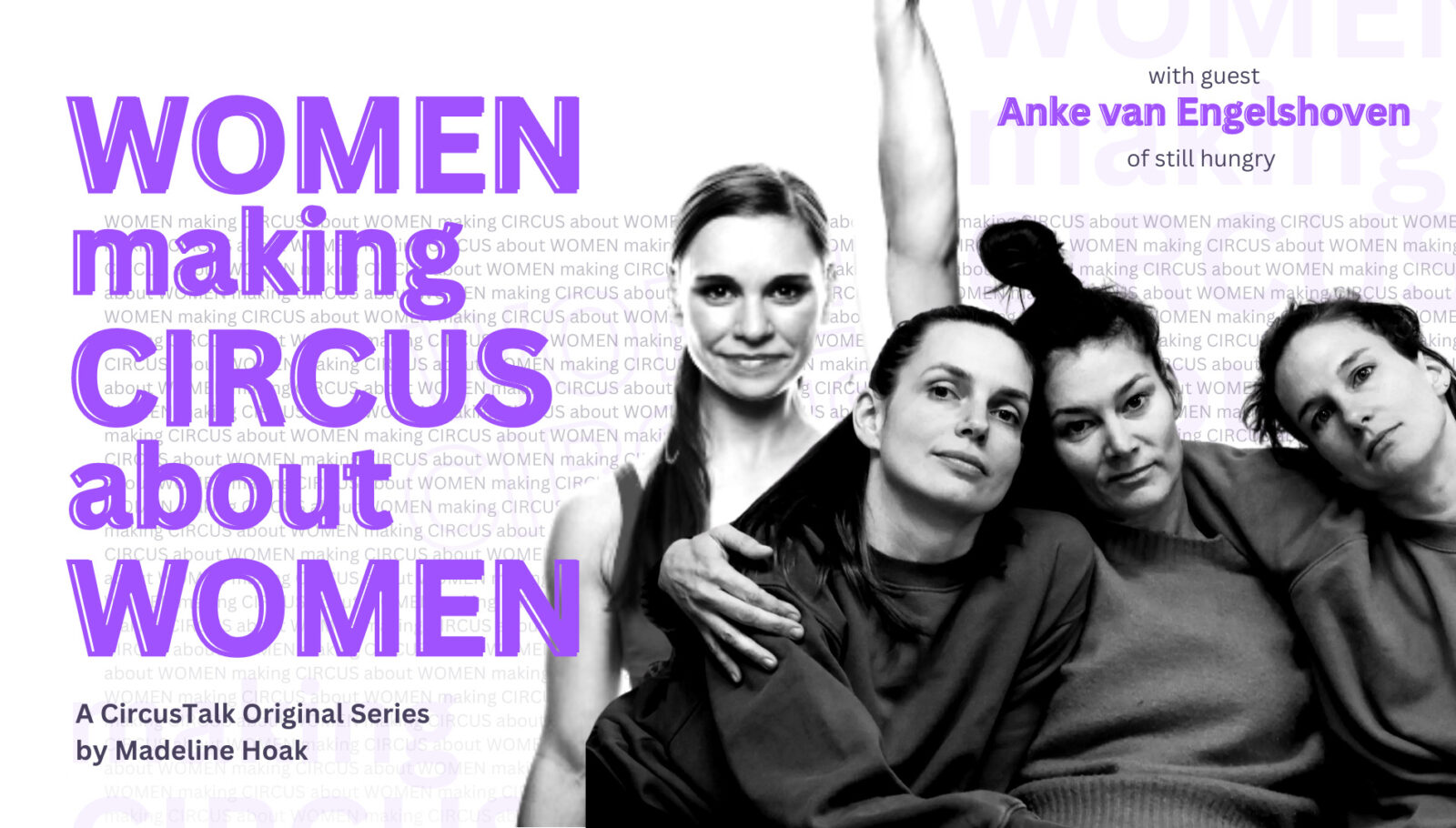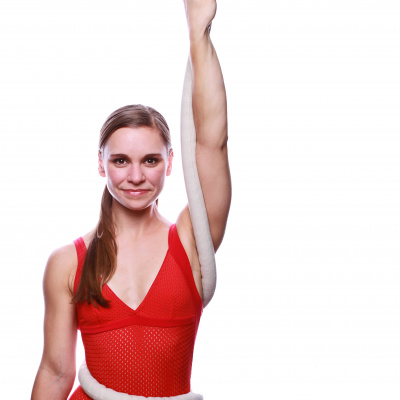Motherhood & Circus: A Conversation with Anke van Engelshoven of still hungry
One theme that I’ve been exploring in this series has been the difference, or balance between celebration and redress, filling a historical hole due to underrepresentation. At this moment in history, they are integrally intertwined: it seems any show by women about women will be both. Both are necessary, and therefore celebration and redress can only be theoretically separated. still hungry’s show Raven adds a third layer to the mix: redefining, reclaiming, or just calling out a harmful cultural phrase.Rabenmaderis a German phrase, “It’s raven mother translated, and this is a bad, bad saying. It’s used to condemn a mother, meaning she doesn’t take care enough about her kids,” Anke van Engelshoven explained to me, “she leaves them alone, she goes back to work very quickly. So it’s really like a neglectful mother.” I delicately wondered, “Is there an equivalent of this word for fatherhood?” “No,” Anke briskly replied. (Had I not asked rhetorically, the way she shook her head and laughed would have signaled a bit of pity for my naiveté. Instead, we had a good chuckle together.) It was worth asking — just in case.
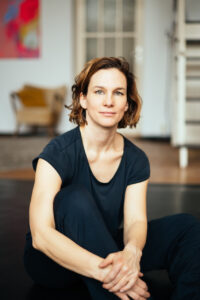
Rabenmutter is an old phrase that has lingered into present-day German culture, but Anke explained that its current use is “specifically about career and parenthood. I think, of course, it’s used less and less, and there are changes in society. But on the other end, it’s still applying. And our experience was that there’s a lot of opinions about being a mother: how to do things right, how to breastfeed, how long to breastfeed, how you take the kids to kindergarten early — some say it’s too early. It feels like everybody really wants to get involved with your decisions.”
We felt like playing with this expression because it’s very German. Being judgmental about mothers also feels to us very German, and this is why we took the saying as a title.” I wondered, “You say it’s a very German phrase, but it it feels like a very universal theme.” Anke concurred, “Yes, it is. Even though bad mom, is not existing in another language. It’s still a theme all over the world.” Sharing the experience of being mothers and professional circus artists was the basis for still hungry, comprised of Anke, Lena Ries, and Romy Seibt— all circus artists, all mothers — and addressing the concept of rabenmuder became the catalyst for Raven.
The three were friends before fellow company members, and they were all mothers before they were friends. Anke and Romy were peers at circus school in Berlin. Lena (trained at ENC), moved to Berlin later. The three converged during a production at the Chameleon Theater in 2010. The three were, “tired from the industry a bit, tried of being in a work context with a lot of men and male forces. We were feeling like we wanted to make our own company, our own pieces. We started with another collective, with another woman — we were four. We had one production. And then it fell apart a little bit; the 3 of us were left. And we started fresh and new.”
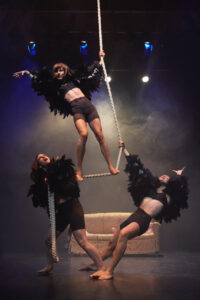
Sitting in Lena’s kitchen, brainstorming a name for the trio, an image of a skinny tiger caught their eye. It was still hungry. They were still hungry — for work, for performance opportunities, for art making. Anke described it as “this vivid demand to create.” Motherhood had not diminished their drive nor ability. “We applied for funding to create Raven with the Chameleon Theatre, and that’s where it all started. It felt like we were all having a similar experience in the industry. We felt like we wanted to talk about that in our piece: about that connection, about the challenges, and the beauty, also the hard parts about it. We felt very little people are talking about this. We knew very little acrobats who are also mothers, and who are addressing themes and difficulties. So we’ve felt a bit like: we had us.”
I was curious if the company experienced parental judgment just from German culture, or if it trickled into the circus community as well. Anke described general hardships with the corporate-performing lifestyle: travel, late nights, etc. More specifically, “Lena, she’s a contortionist. There was one director who booked her after she had a child and really frankly asked her if her body is still the same.” I prickled. That question undermines the supposed virtues of the circus: all are welcome and physical feats reign, not physique… supposedly. “So insulting for her,” Anke continued, “It seems there’s not a lot of space for mothers.”
Anke described that continuing corporate work after having a child felt complicated, not feasible. Directors or producers were inflexible. It felt like too much to ask to accommodate. To me, this signals that the corporate circus system, like many workplaces, are not structured in a generous way. Maybe it isn’t complicated. Maybe it’s not too much to ask. With appropriate accommodations and communication, maybe the industry can continue to value artists who are parents. Because that is at the root of this: when a system is structured in a way that excludes a group of people it is signaling that that group of people isn’t valuable to the system.
And yet, with their own systems and communication, still hungry has created beautiful, professional, impactful circus. “Whenever we have creation time, or rehearsal time. We know things can change. We know when the kids are sick in the morning, it’s okay to bring them with, or it’s okay to ask for this flexibility. It really feels right.”
Anke described the show as happening in chapters with a loose dramaturgy. They use language, circus, dance. “It starts with a take on how we do circus. Lena is a contortionist, Romy does vertical rope, I do straps.” Then, the trio gives some context, “how many kids we have and how old we are, which is always good to bring up!” Then, they take the audience on a journey through different scenes that show stories in a more personal way. Anke has a scene in the club, a recorded poem describing what she misses about before. Romy juggles laundry as a metaphor for overwhelm. Lena performs contortion on a couch in a private moment ‘checking’ her body image and her flexibility. It’s really touching because it goes very private and very intimate. And she shows herself in, let’s say ‘ugly’ positions, which doesn’t fit to contortion at all. It’s kind of super naked, and super private, and super intimate. It’s a little bit funny, but on the other end, it’s super sad. People start crying and laughing at the same time.”
Anke said, “acrobatic skills are not the main focus. They’re just happening more on the side in order to tell our story. Each of us has a little bit of a personal story, and then in the end we find each other and have a bit of a revolution against the industry. We have these feathered jackets, like birds, like ravens. We have a punk rock scene, and it’s a bit like we take everything apart. And it’s a bit this image of: together we can create something new; together we can make our own reality. There’s another part of Confessions where we talk about our biggest fears, and the last bit — now I tell the whole show! — is our kids coming on the screen. It’s an interview with them, and it’s really nice because it gives them a voice. They’re saying a bit funny things about how they see us. It’s a nice ending for the show first because it keeps things kind of neutral. We went through all the feelings on the sides of motherhood, and in the end they get the last say. It’s neither bad or good. They are amazing human beings. And sometimes we are the most happy we got them, and sometimes we have doubts about decisions, and it just puts them at a distance by themselves.”
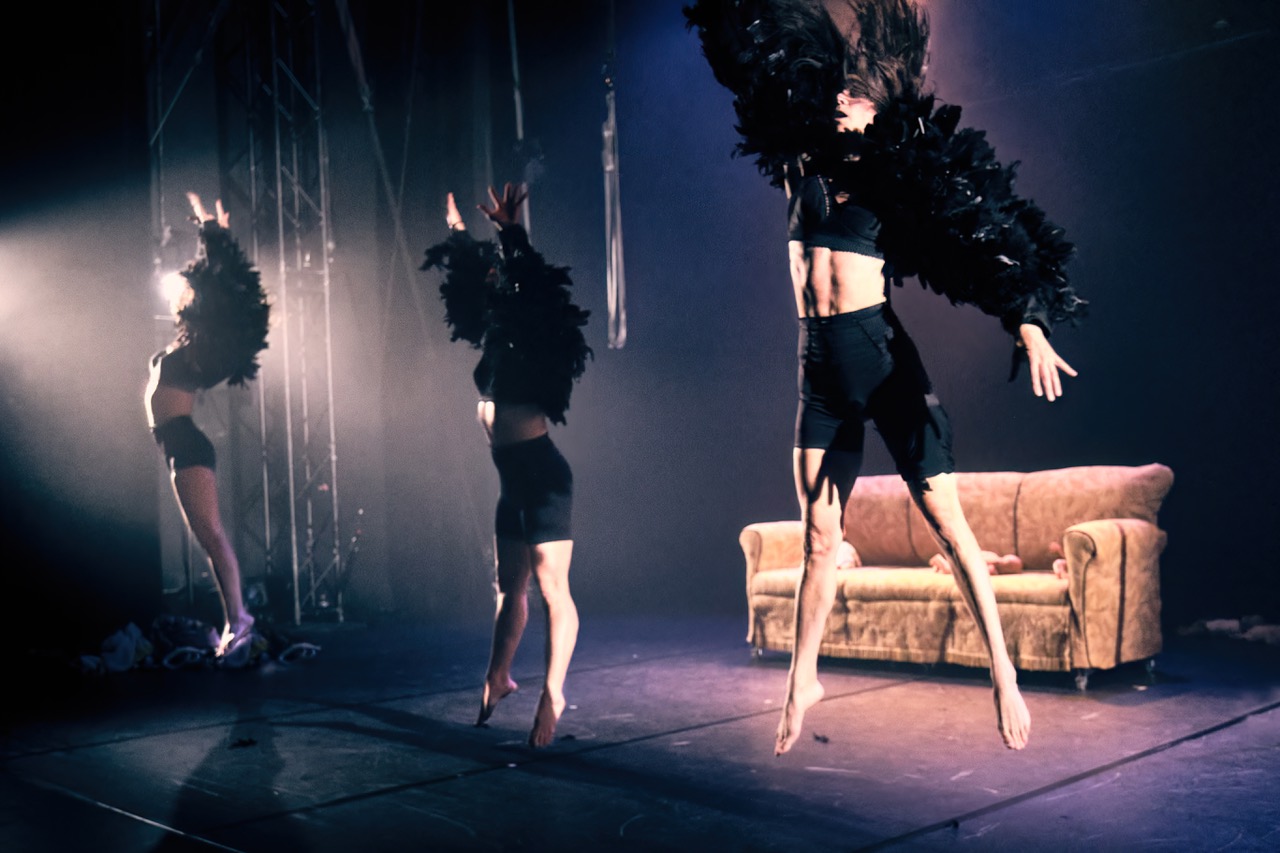
It is these contradictions, hard topics, and mostly unspoken experiences that still hungry hopes to share with audiences through Raven. “We really have this wish of touching them emotionally. The experience is that we often do, and it doesn’t matter if they are female, or male, or however they are identifying as mothers or not mothers, because in a way, just having a mother is enough to connect the theme! Mostly, we aim to leave the audience with the feeling of, we want to talk about it. And that’s also the greatest response we got. People came up to us and said, we’re so happy you talked about it. And they were so touched by the honesty in it, and it invited them to talk about it. In life, going back home and talking about it with their partners and kids. This need for communication. Our experience in Germany is that no one talks about the hard sides of motherhood. And it would be so good if our mothers or other friends would talk about it more. It doesn’t mean that it stops you from becoming a mother, but it helps you to not feel wrong if you have doubt or if you have hard feelings about motherhood or your kids and to create this openness of talking about fears about secrets about hard parts about hate about whatever it is. Just open it up!”
Raven was created in 2018. Anke said that it grew more solid with repetition and only shifted a bit as other life events have happened to the performers. “It stays fresh and authentic.” It had a well-received run at the Edinburgh Fringe Festival, and then the pandemic halted the show’s momentum.
The website and reviews tout the humor of the show. I was curious if humor happened naturally through the creation process or if it was a premeditated choice to make certain parts funny. “It was a very conscious decision to integrate it from the beginning. We’re really serious about what we want to speak about, but it’s so good to bring a bit of lightness. It also opens the channel to connect [to people] even more.” I asked if they had had any pushback or negative reactions to the show. “Right in the beginning when we first started to create it, we had a first showing, there was a lot of pushback. There was a big article in the Berlin newspaper. She [the author] wrote about: what has this subject to do on the circus scene? She was so shocked about it and so ‘anti.’ And we were so shocked about it, and it was really hard because we just started. But it just shows, Germany is really still behind with developing new circus. I think people were just overwhelmed.” Anke also noted that some folks thought the show was not “technical” enough. It was a decision. “We don’t want to show off skills anymore. That’s not what it’s about.”It’s not a circus piece, it’s a physical theater piece.” And we got so tired of being put in drawers. It’s a piece about us where we use the skills we have and the tools we have. We found that in the beginning, people really put us in drawers, and we didn’t really fit.” She said that they didn’t feel this as much in places like the UK. They worked with a director there who had more experience with mixed media. “Well, that was really important, but of course we were looking for a female-identifying surrounding. I think also because we were quite sick of the ‘male rooster’ in the industry.”
This peaked my interest, I was curious what felt different about working with an all-female identifying team. “The most, is the sensitive work environment. I personally feel like I’m so much more understood and listened to it. There was so much more space working with women. For myself, I always find like easily misunderstood from men and also, like, always easily pushed down with ideas like that. It’s very easy for them to celebrate their ideas. And I feel for us, maybe we more are more critical with ourselves, but on the other hand, when we are working together, there is more space for all of us. Yeah, I just think it’s more beautiful work context. It just feels different.”
Anke relayed a story about touring in Canada and presenting the work to students at a circus school. She described how thankful the students were; the show presented them with topics they hadn’t thought about before: aging, motherhood, what will happen in twenty years, circus as a medium for storytelling. “It’s personal, and naked, it’s so raw, and so brutally honest.” Often filled with young people starting their careers and a few older mentors and coaches, circus schools have imbalanced intergenerational connection.”Romy is 50, I’m 44, Lena is 38. So we’re not young performers and for a generation of fresh generation they’re usually 19, 20 and they don’t really think about what’s after all like motherhood or what’s in 20 years.” It felt important to have, “the exchange with younger acrobats and allowing them to see a show that made them think.”
still hungry is looking to reinvigorate the momentum for Raven after engagements were canceled due to the pandemic. They are also in the process of developing a new show that will premiere in February 2024. For more information you can visit still-hungry.net.
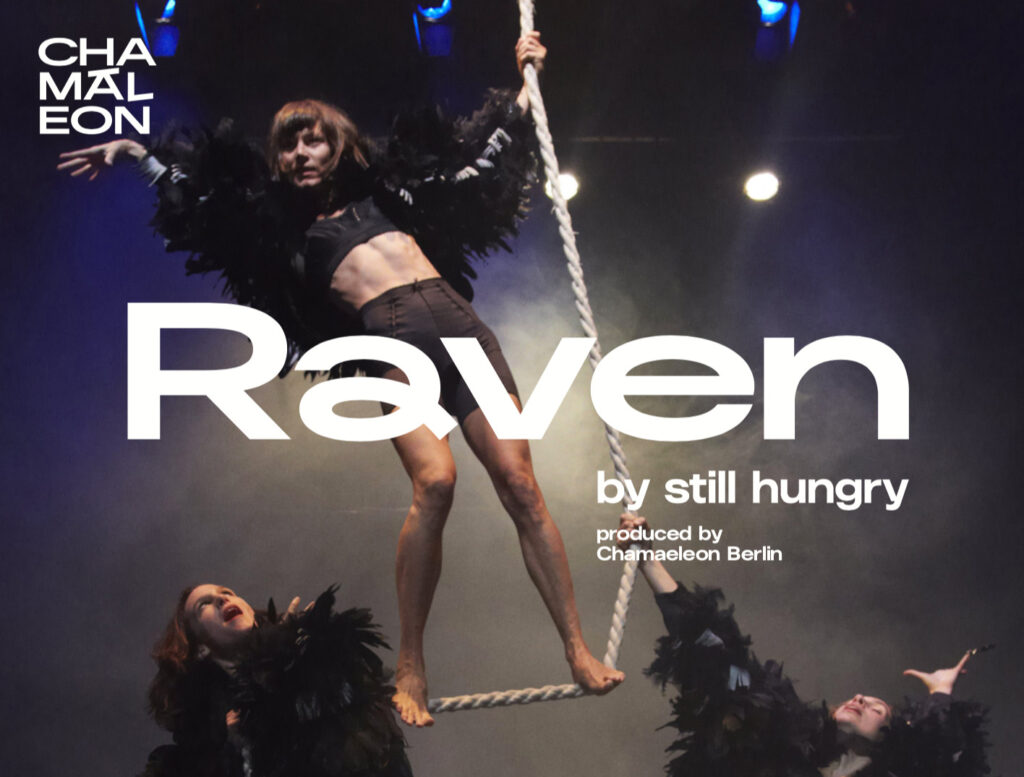
Do you have a story to share? Submit your news story, article or press release.

